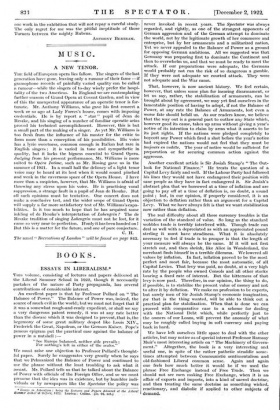MUSIC .
A NEW TENOR.
THE field of European opera lies fallow. The singers of the last generation have gone, leaving only a rumour of their fame —if gramophone records of painfully varied quality can be called a rumour—while the singers of to-day wisely prefer the hospi- tality of the two Americas. In England we are contemplating further seasons of Grand Opera at Covent Garden, and in view of this the unexpected appearance of an operatic tenor is for- tunate. Mr. Anthony Williams, who gave his first concert a week or so ago at Lady Forres's house, comes with imposing credentials. He is by report a " star " pupil of Jean de Reszke, and his singing of a number of familiar operatic arias • proved his technical accomplishment. However, this is but a small part of the making of a singer. As yet Mr. Williams is too fresh from the influence of his master for the critic to form more than a conception of his possibilities. His voice has a lyric sweetness, common enough in Italian but rare in English singers ; it is varied in tone and sympathetic in quality, but it lacks the bigness essential to Grand Opera. Judging from his present performance, Mr. Williams is more suited to Opera Intinze, such as Mr. Rosing gave us in the summer of 1921. In a small hall the delicacy of a light tenor voice may be heard at its best when it would sound pinched and weak in the cavernous space of the Opera House. I have more than a suspicion, however, that Mr. Williams is afraid of throwing any stress upon his voice. He is practising vocal suppression, a strange fault in a pupil of Jean de Reszke. But all such opinions must be tentative. One concert does not make a conclusive test, and the wider scope of Grand Opera will supply a far more satisfactory test of Mr. Williams's capa- bilities. Is it too much to hope that he has acquired some inkling of de Reszke's interpretation of Lohengrin ? The de Reszke tradition of singing Lohengrin must not be lost, for it came so very near to perfection. If only it has been handed on I But this is a matter for the future, and one of pure conjecture.






































































 Previous page
Previous page